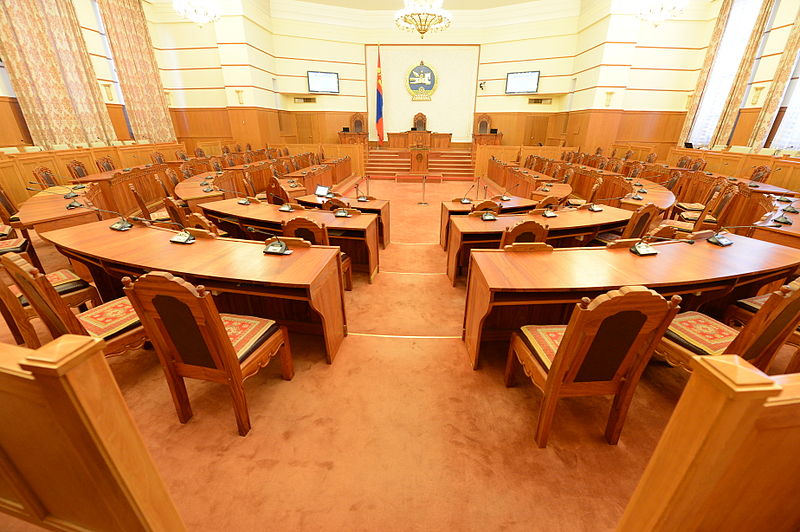There is growing speculation that it is only a matter of time before the Democratic Party (DP) calls for Prime Minister Altankhuyag’s ouster. It is a reasonable prediction given the many missteps of the current government over the last year and the dire economic consequences its policies have produced, but I am not completely convinced it is the most probable outcome for the PM.
The current government is a factious coalition that would have to be replaced with another factious coalition, and the million dollar question is whether another faction leader within the DP has the ability to cobble a ruling coalition together without the support of the PM’s own faction the “Altangadas.” Moreover, any rival for the Prime Minister-ship would have to contend with the fact that even if he could get all the DP members on board with his leadership, he still would fall short of the 39 seat threshold to form a government. It would be more than just a challenge of getting party votes. It would also be a challenge of inter-party coalition building.

Don’t count the PM out quite yet
Most of us are happy to maintain a basic view of Mongolian party politics. It’s enough to know that there is a party called the “Democrats,” a party that used to be the “old Communists”, and a smattering of independents and small party politicians. The thing about the parties, though, is that they are becoming annoyingly resistant to simple generalizations. This is especially true under the current government. Beyond the fact that it is a coalition government between the majority DP and a minority coalition comprising the MPRP, which is a splinter group from the “old Communists” (now MPP), and several independent and small party parliamentarians, the DP itself is a highly factious party.
The reason one is inclined to take the generalized view of the parties is that it feels like that should offer a quick and dirty way to understand the ebb and flow of politics in the country. One party is pro-business. The other is pro-environment. Yet another is big on national welfare programs. However, these sorts of generalized views along party dimensions are becoming less meaningful with each passing day given that there seems to be very little party discipline among the DP and even among the opposition MPP in their respective ideological and policy domains.
As a comparative example, something similar is occurring with the current US government shutdown. In the US we see a highly factious Republican Party forced to use politically disastrous tactics in pursuit of an arguably unwinnable strategy. There are many reasons being thrown around by pundits to explain what is going on, but at a fundamental level the situation shows an extreme faction within the party, namely the Tea Party, taking advantage of a decline in party discipline.1 Instead of the party representing a compromise of varying but close ideological and policy preferences that provides its members the benefit of being stronger than the sum of their individual parts, the mismatch of party loyalty with weak party discipline is hamstringing moderates and providing a power advantage to more extreme elements within the party. Hypothetically, in a system without a notion of party loyalty, the more moderate wing of the Republican Party would be able to align with the moderates in the Democratic party to form a pretty strong majority, but the taboo of crossing party lines prevents a moderate majority from forming, giving the extreme elements an advantage in an environment of weak party discipline.

These two are rumored to covet the PM’s job. (Z. Enkhbold and Kh. Battulga)
There are elements of this in the current political situation in Mongolia. The PM has proven himself so far competent at maintaining a coalition of factions that one could argue has kept rivals weak as much as it has provided him political strength. In fact, I am inclined to favor the former over the latter, that the PM has proven himself adept at keeping rivals weak rather than building a strong ruling coalition. The proof of this is in looking at his cabinet which is made up of MPs and politicians with a hodge-podge of ideological positions that often times are at cross-purposes. If it sometimes feels like the government is negotiating against itself when it comes to policy positions on highly controversial issues such as Oyu Tolgoi or Tavan Tolgoi, that feeling is not unfounded. The government IS negotiating against itself with more extreme elements holding sway much like the Tea-party in the US.
During the height of MPP (then MPRP) domination of Mongolian politics in the early 2000s under N. Enkhbayar’s leadership, one of the advantages the party had over the DP was its strong party discipline. The MPP succumbed to factional infighting during the last parliament, and the disputes were so severe that one faction even broke off and formed the new MPRP, which is a member of the current government. The increasing factional quality of the DP and MPP means that today we see political leaders trying to achieve the delicate balance of maintaining the illusion of party discipline while navigating the real dangers and challenges of weak factional power. The results of those attempts have so far been hardly encouraging from a governance and policy perspective.
As the economic situation in Mongolia continues to worsen, the growing speculation about the PM’s prospects of holding on to power are reasonable, but it still remains to be seen if there is a rival in DP that can either impose strong party discipline or form a rival coalition of factions that adds up to at least 39 seats. There are many reasons to argue that the PM’s government should be on the way out, and yet it really comes down to whether the PM and his allies can maintain his marginal advantage in wielding the weak power of factional politics.
Footnotes
1. See example of John Sides, “The 5 species of House Republicans,” The Washington Post, http://www.washingtonpost.com/blogs/monkey-cage/wp/2013/10/04/the-5-species-of-house-republicans/, 2013-10-04.



